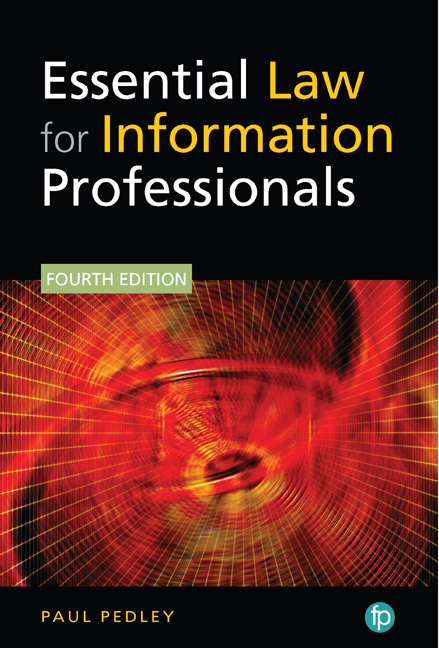Book contents
- Frontmatter
- Dedication
- Contents
- Disclaimer
- List of Figures and Tables
- Table of Statutes, Etc.
- Table of Cases
- Abbreviations
- Glossary of Terms
- Preface
- Chapter 1 General law and background
- Chapter 2 Library Law
- Chapter 3 Copyright
- Chapter 4 Legal Deposit
- Chapter 5 Breach of Confidence
- Chapter 6 Contracts and Licensing Agreements
- Chapter 7 Data Protection
- Chapter 8 Privacy
- Chapter 9 Freedom of Information
- Chapter 10 Human Rights
- Chapter 11 Re-use of Public Sector Information
- Chapter 12 Defamation
- Chapter 13 Professional Liability
- Chapter 14 Cybersecurity and Cybercrime
- Chapter 15 Disability Discrimination
- Chapter 16 Other Legal Issues Relevant to Librarians
- References
- Appendix 1 Brexit and the Orphan Works Exception
- Appendix 2 CILIP'S Ethical Framework
- Index
Chapter 1 - General law and background
Published online by Cambridge University Press: 27 March 2020
- Frontmatter
- Dedication
- Contents
- Disclaimer
- List of Figures and Tables
- Table of Statutes, Etc.
- Table of Cases
- Abbreviations
- Glossary of Terms
- Preface
- Chapter 1 General law and background
- Chapter 2 Library Law
- Chapter 3 Copyright
- Chapter 4 Legal Deposit
- Chapter 5 Breach of Confidence
- Chapter 6 Contracts and Licensing Agreements
- Chapter 7 Data Protection
- Chapter 8 Privacy
- Chapter 9 Freedom of Information
- Chapter 10 Human Rights
- Chapter 11 Re-use of Public Sector Information
- Chapter 12 Defamation
- Chapter 13 Professional Liability
- Chapter 14 Cybersecurity and Cybercrime
- Chapter 15 Disability Discrimination
- Chapter 16 Other Legal Issues Relevant to Librarians
- References
- Appendix 1 Brexit and the Orphan Works Exception
- Appendix 2 CILIP'S Ethical Framework
- Index
Summary
Legal system
The United Kingdom consists of three distinct jurisdictions, each with its own court system and legal profession: England and Wales, Scotland, and Northern Ireland.
When the Labour Party came to power in 1997, they embarked on a number of constitutional reforms. These included the introduction of freedom of information legislation, the implementation of the European Convention on Human Rights (ECHR) into UK law, replacing the Law Lords with the Supreme Court as the highest court in the land, and a programme of devolved government. As a result, there is a separate Scottish Parliament and a Welsh Assembly. Northern Ireland already had its own Assembly.
The Scottish Parliament legislates in areas of domestic policy but matters best dealt with at UK level remain reserved to the UK parliament and government.
The Government of Wales Act 1998 gave the Welsh Assembly powers to legislate in domestic areas and the Assembly's powers were strengthened firstly under the Government of Wales Act 2006, and again under The Wales Act 2017. There are still a number of legal tests that must be passed under the reserved powers model, for example, Acts of the Assembly must not relate to any reserved matter set out in Schedule 7A of the 2006 Act as amended by the Wales Act 2017 (such as modern slavery, electricity, road and rail transport, medicines). In addition, Assembly Acts must not breach any of the restrictions set out in Schedule 7B of the 2006 Act as amended – so, for example, they must not modify private law (such as contract, tort, property) unless it is for a devolved purpose, or modify certain criminal offences (such as any sexual offences). Instead of telling the Assembly what it can do, the legislation sets out the things that it cannot do – the ‘reservations’.
While the legislation only sets out details of matters that are reserved to the Westminster Parliament, one can deduce from this those areas that are devolved. They would include areas such as:
• Some tax raising powers
• Roads and motorways, speed limits, bus route regulation
• Some aspects of energy such as granting or refusing planning permission for power plants and energy generating schemes up to 350 megawatts; approving any new oil and gas schemes in Wales, including permission to give the go ahead for fracking plans; licensing for any new coal mines
• Tourism.
- Type
- Chapter
- Information
- Essential Law for Information Professionals , pp. 1 - 18Publisher: FacetPrint publication year: 2019



